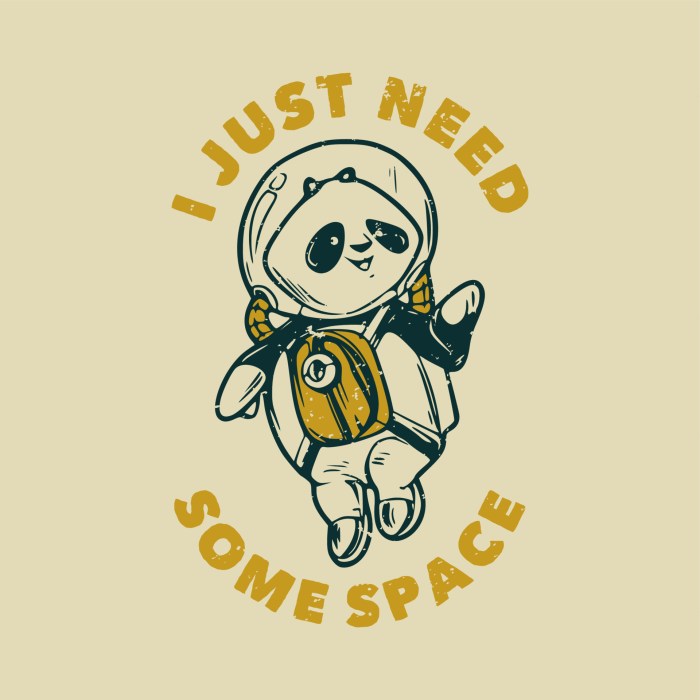
I Just Need Some Space: Understanding the Need for Boundaries
“I just need some space” – a simple phrase, yet loaded with meaning. It’s a statement that can signal a need for solitude, a desire for personal growth, or a plea for healthier boundaries within relationships. This phrase is often misunderstood, leading to hurt feelings and strained connections.
But by exploring its various interpretations, we can uncover the vital role space plays in our well-being and relationships.
From navigating the complexities of romantic partnerships to cultivating self-care practices, understanding the need for space is crucial. It’s about finding the delicate balance between connection and independence, a balance that allows us to thrive both individually and within our relationships.
The Meaning of “I Just Need Some Space”
The phrase “I just need some space” is a common one, often uttered in moments of emotional distress or conflict. While seemingly straightforward, this statement can hold a multitude of meanings depending on the context and the individuals involved.
Understanding the various interpretations and the underlying emotions behind this phrase can be crucial for navigating relationships and fostering understanding.
Interpretations of “I Just Need Some Space”
This statement can be interpreted in various ways, each reflecting a distinct need and emotional state.
- Physical Distance:In its simplest form, “I just need some space” can refer to a desire for physical separation. This might involve needing time alone to decompress, reflect, or simply enjoy some solitude. For example, someone might say this after a long day at work or a stressful social event.
- Emotional Distance:More often, “I just need some space” signals a need for emotional distance. This might arise when someone feels overwhelmed, stressed, or emotionally drained by a relationship. They might need time to process their feelings, regain their composure, or simply create some emotional boundaries.
- Time for Reflection:This phrase can also indicate a need for time and space to think things through. Perhaps someone is grappling with a difficult decision, experiencing conflicting emotions, or simply needs to process a situation before responding.
Emotional Context Behind “I Just Need Some Space”
The emotional context behind this phrase is often complex and multifaceted. Some common emotions associated with it include:
- Overwhelm:Feeling overwhelmed by stress, demands, or emotional intensity can lead to the need for space.
- Frustration:When communication breaks down or needs aren’t met, frustration can build, leading to a desire for space.
- Anger:Anger, whether directed at oneself or another, can create a need for space to calm down and avoid escalation.
- Sadness:Grief, loss, or disappointment can trigger a need for space to process emotions and find solace.
- Fear:Fear of vulnerability, rejection, or conflict can also contribute to the desire for space.
Situations Where “I Just Need Some Space” Is Commonly Used
This phrase is frequently used in various situations, including:
- Relationship Conflicts:During arguments or disagreements, partners might need space to cool down, process their feelings, and regain perspective.
- Personal Stress:Individuals might express this need during times of significant stress, such as job loss, illness, or family crises.
- Feeling Overwhelmed:When someone feels overloaded with responsibilities, commitments, or demands, they might need space to prioritize and manage their workload.
- Boundaries and Limits:This phrase can be used to set boundaries and communicate limits in relationships. For example, someone might say this to avoid overstepping or feeling pressured.
The Need for Space in Relationships
Relationships thrive on a delicate balance of togetherness and independence. While intimacy and shared experiences are crucial, personal space plays a vital role in fostering healthy and fulfilling connections.
The Importance of Personal Space
Personal space is not about detachment or disengagement; it’s about respecting individual needs and boundaries. When partners have their own space, they can pursue personal interests, recharge, and maintain a sense of self. This autonomy allows them to return to the relationship feeling refreshed and engaged, contributing to a more vibrant and fulfilling dynamic.
Negative Impacts of Lack of Space
When couples constantly encroach on each other’s personal space, it can lead to a range of negative consequences.
- Increased Conflict:Constant togetherness can lead to resentment, frustration, and ultimately, conflict. Individuals may feel suffocated, leading to arguments and tension.
- Loss of Individuality:Without space for personal growth and exploration, partners may lose touch with their individual identities and interests. This can lead to feelings of stagnation and a sense of being trapped.
- Emotional Exhaustion:Constantly being around each other can be emotionally draining, especially if there are underlying issues or unresolved conflicts. Lack of space can exacerbate these issues and lead to emotional exhaustion.
Healthy Ways to Communicate the Need for Space
Open and honest communication is essential when it comes to personal space in relationships.
Sometimes, I just need some space, not just in my apartment, but in my mind too. It’s amazing how much clutter can weigh you down. When I feel overwhelmed, I find it helpful to check out 6 brilliant organizing ideas for inspiration.
The tips there help me declutter my physical space, which in turn helps clear my mental space. It’s a simple trick, but it works wonders for me!
- Express Your Needs:Clearly articulate your need for space, emphasizing that it’s not a reflection of your feelings for your partner. Use “I” statements to express your feelings and avoid blaming or accusing.
- Establish Boundaries:Set clear boundaries about your personal space, whether it’s time alone, activities you enjoy doing independently, or simply needing some quiet time.
- Negotiate and Compromise:Find a balance that works for both partners. This might involve setting aside specific times for individual activities or creating a shared space where both partners can enjoy their own interests.
Space as a Form of Self-Care
Taking space, often seen as a way to navigate conflict in relationships, is also a powerful form of self-care. Stepping back from the demands of daily life allows us to recharge, reconnect with ourselves, and return to our relationships with a renewed sense of energy and clarity.
Benefits of Solitude and Introspection
Solitude and introspection are essential for personal growth and well-being. Spending time alone allows us to:
- Process emotions:When we are alone, we have the space to reflect on our thoughts and feelings without external influences. This can be particularly helpful during times of stress or emotional turmoil.
- Gain clarity:Solitude provides a quiet space to think clearly and make decisions without distractions. It allows us to assess our priorities, identify our values, and gain a better understanding of ourselves.
- Increase creativity:Many creative individuals find that solitude sparks inspiration. When we are free from external stimuli, our minds can wander and make new connections, leading to innovative ideas and solutions.
- Reduce stress:Our modern world is filled with constant stimulation and demands. Taking time for solitude can help us to de-stress and relax, allowing our bodies and minds to recover from the daily grind.
Creating Personal Space in a Busy Life
In today’s fast-paced world, it can be challenging to find time for solitude. However, even small amounts of personal space can make a big difference. Here are some tips for creating personal space in a busy life:
- Schedule time for yourself:Just like you would schedule appointments or meetings, block out time in your calendar for activities that nourish your soul, whether it’s reading, taking a walk, meditating, or simply enjoying a cup of coffee in silence.
- Create a dedicated space:Even if it’s just a corner of your bedroom or a small nook in your home, designate a space where you can go to relax and unwind. Make it comfortable and inviting, and try to keep it free from distractions.
- Disconnect from technology:Our phones, computers, and social media can be constant sources of stimulation and stress. Make a conscious effort to disconnect from technology for at least a short period each day. You might be surprised at how much more peaceful and present you feel.
- Engage in activities you enjoy:Spending time doing things you love is a great way to recharge and connect with yourself. Whether it’s painting, playing music, gardening, or anything else that brings you joy, make time for these activities in your life.
Respecting Boundaries

In the tapestry of relationships, boundaries are the threads that weave together a sense of safety, respect, and understanding. They act as invisible fences that define our personal space and establish limits on how others can interact with us. Respecting these boundaries is essential for fostering healthy and fulfilling connections.
Sometimes, I just need some space to recharge and decompress. I’m not talking about moving to a remote island, just a little quiet time to myself. But that can be tricky with neighbors, especially during the holidays. This year, I’m thinking of making a little something special for them, maybe some homemade fortune cookies filled with funny holiday messages.
There are some great ideas for festive fortune cookies here , and maybe they’ll appreciate the thoughtfulness enough to give me a little extra space this season.
Setting Clear Boundaries
Establishing clear boundaries is the first step towards ensuring they are respected. This involves defining what is acceptable and unacceptable behavior in our interactions with others. Clear boundaries are like road signs, providing direction and guidance to navigate relationships effectively.
- Identify your values and needs:What is important to you? What makes you feel comfortable or uncomfortable? What are your non-negotiables?
- Communicate your boundaries:Use assertive language to express your needs and expectations. For example, instead of saying “I don’t like it when you…” try “I feel uncomfortable when you…” or “I need you to…”
- Be consistent:Enforce your boundaries consistently, even when it’s difficult. This shows others that you mean what you say and helps build trust.
Communicating Boundaries Effectively
Effective communication is the bridge that connects our boundaries with the understanding of others. It involves expressing our needs clearly, respectfully, and assertively.
- Use “I” statements:Focus on your own feelings and experiences. For example, instead of saying “You’re always interrupting me,” say “I feel disrespected when I’m interrupted.”
- Be specific:Clearly define the specific behaviors that cross your boundaries. For example, instead of saying “I need more space,” say “I need you to respect my need for alone time after work.”
- Listen actively:Pay attention to the other person’s perspective and be open to their feedback. This can help you understand their point of view and find common ground.
Benefits of Respecting Boundaries
Respecting boundaries is not just about protecting ourselves, it’s also about strengthening our relationships. When we respect each other’s boundaries, we create a foundation of trust, mutual respect, and understanding. This allows us to connect on a deeper level, knowing that our needs and values are honored.
- Improved communication:Respecting boundaries fosters open and honest communication, as individuals feel safe to express their needs and feelings without fear of judgment or rejection.
- Increased trust:When we respect each other’s boundaries, we demonstrate that we value their autonomy and well-being. This builds trust and strengthens the bond between us.
- Reduced conflict:By setting clear boundaries and respecting them, we can minimize misunderstandings and conflicts that often arise when our needs are not met.
The Importance of Communication
Communication is the cornerstone of any healthy relationship, and this is especially true when it comes to navigating the need for space. Open and honest communication can help bridge the gap between your desire for personal time and your partner’s needs.
It allows you to express your feelings and needs clearly, fostering understanding and empathy.
Effective Ways to Communicate Your Need for Space
Communicating your need for space effectively requires being direct and respectful. It’s about expressing your feelings without blaming or accusing your partner. Here are some examples of effective ways to communicate your need for space:
- “I’m feeling overwhelmed lately and need some time to myself. I’d love to spend some quality time with you later this week.”
- “I’m feeling a bit drained and need some space to recharge. I’ll be back in a few hours and we can catch up then.”
- “I’m feeling a bit stressed and need some time to decompress. Could we maybe do something together tomorrow instead?”
Active Listening and Understanding
Active listening goes beyond simply hearing your partner’s words. It involves truly understanding their perspective, acknowledging their feelings, and responding with empathy. When your partner expresses their need for space, avoid getting defensive or taking it personally. Instead, try to understand why they need this time and how you can support them.
Sometimes, you just need some space, a little time to recharge and reconnect with yourself. Maybe a relaxing bath with some candles, a good book, or a new journal to jot down your thoughts? If you’re looking for some inspiration for gifts that help women find that precious space, check out this gift guide for women.
Whether it’s a luxurious bathrobe, a cozy blanket, or a set of aromatherapy oils, finding the right gift can help someone create their own personal sanctuary.
This might involve asking questions like:
- “What can I do to help you feel more comfortable during this time?”
- “Is there anything I can do to support you while you’re taking some space?”
- “What can we do together when you’re feeling more energized?”
By actively listening and understanding your partner’s perspective, you can create a space for open dialogue and foster a deeper connection, even when you need some time apart.
The Role of Time and Distance: I Just Need Some Space
Taking a break from a relationship can be a powerful tool for personal growth and reflection. It allows you to step back from the intensity of the relationship and gain a new perspective. While the idea of spending time apart may seem daunting, it can be a healthy and necessary step in navigating the complexities of love.
Benefits of Taking a Break
Time and distance can be a valuable opportunity to re-evaluate your relationship and address any underlying issues. By creating space, you can:
- Gain clarity:Time apart can help you identify what you truly want and need from the relationship. It allows you to reflect on your feelings, priorities, and goals without the pressure of constant interaction.
- Focus on yourself:A break provides an opportunity to prioritize your own needs and well-being. You can pursue personal interests, reconnect with friends and family, and engage in activities that bring you joy.
- Heal and grow:If there have been conflicts or issues in the relationship, time and distance can allow for healing and personal growth. You can work through your emotions, develop coping mechanisms, and gain a better understanding of yourself.
- Strengthen the relationship:By taking a break, you can appreciate the value of the relationship and learn to communicate more effectively. The time apart can foster a renewed sense of respect, understanding, and appreciation.
Challenges of Taking a Break
While taking a break can be beneficial, it’s important to be aware of the potential challenges:
- Uncertainty:It’s natural to feel anxious or uncertain about the future of the relationship during a break. This can be especially true if you’re unsure about your feelings or the reasons for taking a break.
- Communication breakdowns:Establishing clear boundaries and expectations for communication during the break is crucial. Miscommunication or lack of communication can lead to misunderstandings and hurt feelings.
- Temptation:During a break, it’s important to resist the temptation to engage in other relationships. This can complicate matters and make it more difficult to reconcile with your partner.
- Potential for drift:If the break is prolonged or communication is lacking, the relationship may drift apart. It’s important to set a clear timeframe for the break and to maintain some level of contact.
Examples of Personal Growth and Reflection
- Rekindling a passion:A couple who took a break to focus on their individual careers found that the time apart allowed them to rediscover their passions and reconnect on a deeper level. They realized that they had grown as individuals and had a renewed appreciation for their relationship.
- Overcoming communication barriers:A couple who struggled with constant arguments took a break to address their communication patterns. They each sought therapy and learned new ways to express their feelings and needs. When they reunited, they were better equipped to communicate effectively and resolve conflicts.
- Finding clarity about future goals:A couple who was unsure about their long-term goals took a break to explore their individual aspirations. This time allowed them to gain clarity about their personal and professional goals and how they aligned with their relationship goals.
Reframing the Need for Space
The phrase “I just need some space” can be a powerful statement, but it’s also one that can be easily misinterpreted. It’s important to understand the nuances of this request and to approach it with empathy and understanding.
Understanding Potential Misinterpretations
The phrase “I just need some space” can be perceived in different ways, depending on the context and the individuals involved. It’s crucial to be mindful of the potential for misunderstanding. Here are some common misinterpretations:
- Rejection:Some people might interpret the request for space as a sign of rejection or disinterest. This can be particularly hurtful if the relationship is already strained.
- Lack of Effort:Others might see it as a sign that the person is unwilling to put in the effort to resolve issues or work on the relationship. This can lead to feelings of frustration and resentment.
- Temporary Fix:The request for space might be perceived as a temporary solution, rather than a genuine need for time and introspection. This can create uncertainty and anxiety about the future of the relationship.
Rephrasing the Request for Space
To avoid miscommunication, it’s helpful to rephrase the request for space in a way that clarifies the intention and avoids negative interpretations. Here are some alternative ways to express the need for space:
- “I need some time to myself to process things.” This emphasizes the need for personal reflection and emotional processing.
- “I need some space to recharge and feel like myself again.” This focuses on the need for self-care and renewal.
- “I need some time alone to work through my feelings.” This acknowledges the emotional component of the request and emphasizes the need for personal space.
Approaching the Topic of Space with Empathy
When someone asks for space, it’s important to approach the topic with empathy and understanding. Avoid making assumptions or jumping to conclusions. Instead, try to understand the underlying reasons for their request. Here are some tips for fostering a respectful and supportive dialogue:
- Listen actively:Pay attention to what the other person is saying, both verbally and nonverbally. Try to understand their perspective and their needs.
- Validate their feelings:Acknowledge their emotions and show that you understand why they might need space. Avoid dismissing their feelings or minimizing their request.
- Set clear boundaries:Communicate your own needs and boundaries. Explain what kind of space you need and what you’re comfortable with. This helps to prevent misunderstandings and ensures that both parties feel respected.






